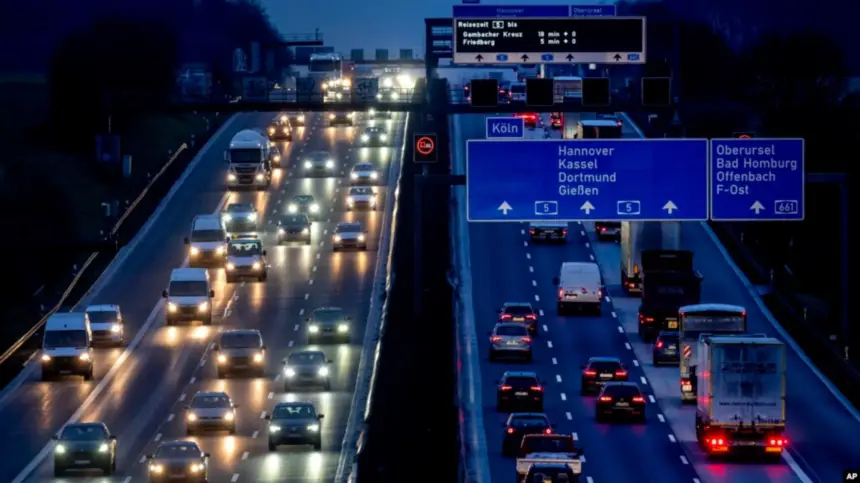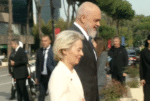The European Union pledged on Thursday to approve an “action plan” aimed at assisting the bloc’s struggling automotive sector. The announcement came as Brussels held talks with industry leaders who have raised alarms about environmental protection tariffs and competition from China.
The EU is under pressure to support an industry that employs over 13 million people and contributes about seven percent to its Gross Domestic Product (GDP).
“The European automotive industry is at a critical moment, and we acknowledge that it faces significant challenges. This is why we are acting swiftly to address them,” said EU Commission President Ursula von der Leyen, promising an “action plan” by early March.
The so-called “Strategic Dialogue,” chaired by the President of the European Commission, brought together car manufacturers, suppliers, civil society organizations, and trade unions.
Representatives from 22 manufacturers, including firms like ‘Volkswagen’, ‘BMW’, ‘Mercedes’, and ‘Renault’, attended the meeting, the Commission said.
The meeting was held as the Commission has committed to making changes to assist businesses, with companies complaining that the EU’s intense focus on the environment and business ethics has led to excessive regulations.
On Wednesday, Brussels revealed a plan to overhaul the bloc’s economic model, amid concerns that low productivity, high energy prices, insufficient investments, and other flaws were causing the EU to lag behind the United States and China.
The automotive sector is in crisis due to high production costs, a problematic transition to electric vehicles (EVs), and increasing competition from China.
Reports of potential job cuts have surged. ‘Volkswagen’ plans to close 35,000 jobs across its centers in Germany by 2030.
Emission Tariffs
Car manufacturers have called for “flexibility” regarding high emissions tariffs they may face in 2025, which the new EU development plan states must be included.
“Immediate financial penalties for the industry are not a good idea because the industry is in difficulty and… needs to be restructured, which will cost a lot of money,” said Patrick Koller, CEO of French parts manufacturer ‘Forvia’, ahead of the meeting.
“When you look back, we have heavy industries that disappeared completely from Europe due to lack of competition.”
To combat environmental changes, the EU has introduced a series of targets for reducing harmful gas emissions that will eventually lead to a phased-out market for fuel-powered cars by 2035.
Around 16 percent of the carbon dioxide (CO2) emissions causing global warming in Europe come from fuel-powered cars, according to the EU.
From this year, car manufacturers must reduce the average CO2 emissions of all newly sold vehicles by 15 percent compared to 2021 levels or face a penalty. Stricter cuts are expected to be adopted later, according to the ‘Transport & Environment’ organization.
The idea is to encourage companies to increase the production of electric, hybrid, and small cars compared to larger, fuel-guzzling vehicles (SUVs).
However, some manufacturers complain that this transition is harder than expected, as consumers are still not accustomed to electric vehicles, which have higher initial costs, and there is still no strong market for used cars.
“We want to stick to the objective… but initially, we might ease the way there,” von der Leyen said on Wednesday.
Critics argue that removing tariffs would unfairly penalize manufacturers who have invested in complying with the new rules.
Sales and Tariffs
Sales of electric vehicles in Europe fell by 1.3 percent last year, accounting for 13.6 percent of all sales, according to the European Automobile Manufacturers Association (ACEA).
A senior EU official said that offering subsidies to businesses for purchasing electric cars is one of the possible solutions.
The 27-nation bloc may also seek to improve the electric car charging network, which has not been sufficiently developed. The EU could also modernize the networks to enable faster charging, reduce energy costs, streamline regulations, and compete with China in battery production, analysts say.
Meanwhile, the number of Chinese electric cars in the EU has grown, reaching 14 percent of the market in the second quarter of 2024.
Brussels has imposed additional tariffs on electric vehicles imported from China, up to 35.3 percent, after evaluating that state support provided to Chinese manufacturers was unfairly undermining European producers of these vehicles.
This action has been opposed by Germany and other EU members and is the subject of a lawsuit by ‘BMW’, ‘Tesla’, and several Chinese car manufacturers. /VOA/







